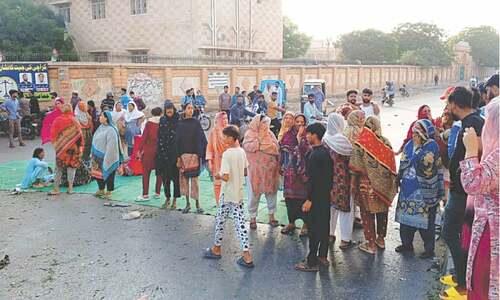KARACHI: The Sindh High Court on Wednesday expressed extreme displeasure over the situation in drought-hit Tharparkar after the relief inspecting judge reported to it that the district administration had failed to distribute transparently amongst the affected people the relief packages provided by the provincial and federal governments.
A two-judge bench, headed by Chief Justice Maqbool Baqar, observed that the reports filed by the district and sessions judge, Mithi, and the relief inspecting judge revealed that the “situation in Thar has perhaps deteriorated further”.
The bench that also comprised Justice Shahnawaz Tariq was hearing a set of constitutional petitions filed by different non-governmental organisations seeking court’s intervention to ameliorate the situation. The petitioners asked the court to take action against the authorities over their failure to provide relief and health facilities to the people of drought-hit Tharparkar.
The report was prepared and submitted by the district judges on orders of the Sindh High Court that has been time and again asking the provincial and federal governments to take effective and practical steps to control the situation in the drought-hit areas of the desert.
The bench took exception to the deteriorating situation in the drought-hit areas and directed the federal and provincial governments to submit detailed reports outlining their efforts to contend with the issues faced by drought affected people and mitigate their sufferings.
Relief Inspecting Judge Mian Fayyaz Rabbani, who is also senior civil judge, Mithi, stated in his report that the district administration did not take preventive action in advance to face this critical situation and the relief packages provided by the federal and provincial governments were not distributed amongst the drought-affected people transparently and fairly.
He referred to a report of the area civil surgeon that stated 319 deaths occurred between January and October 2014, and the victims included 188 children aged up to five years.
Judge Rabbani was directed by the court to ensure and monitor proper supply of food, drinking water, availability of life-saving drugs in the hospitals and to take all possible measures to mitigate the sufferings of drought-affected people.
He said that during his visits to various hospitals and government warehouses to check the records of distribution of medicines and wheat, he found that the people in drought-hit areas died due to poverty and lack of medical facilities.
Besides, he said thousands of animals also died, while a large number of people were shifted to barrage areas.
He reported that premature births were rampant in the affected areas as proper care and food was not being given to the pregnant women who were victims of malnutrition.
He said that the assistant commission of Diplo reported to him that misappropriation and negligence was committed in distribution of relief packages and wheat particularly in Taluka Diplo.
The AC was quoted as telling the judge that wheat was distributed among the favourites.
The judge said in his report that he received numerous complaints in this regard and the matter was referred to deputy commission of Tharparkar for taking further action.
Besides, he said thousands of cartons of mineral water provided by the government for the affected people were dumped in the warehouse of Mithi district headquarters and most of them were found expired, while others were also near to expire.
The relief inspecting judge said that during the inspection of godown he found 300 bags of wheat mixed with mud which were kept for distribution amongst the affected people.
Moreover, he said that the district government did not cooperate with him in collection of information regarding the children who died at hospitals.
Earlier the district and sessions judge, Tharparkar, reported to the SHC that people in the drought-hit parts of Thar suffered a lot mainly due to unavailability of proper medical facilities and potable water as the federal and provincial governments dragged their feet in filling vacant posts of doctors and releasing funds for water supply schemes.
According to his report, patients are suffering a lot due to unavailability of the civil surgeon, physician, pathologist, skin specialist, gynaecologist, radiologist and other health specialists in the drought-hit parts of the district.
Published in Dawn, November 27th, 2014














































